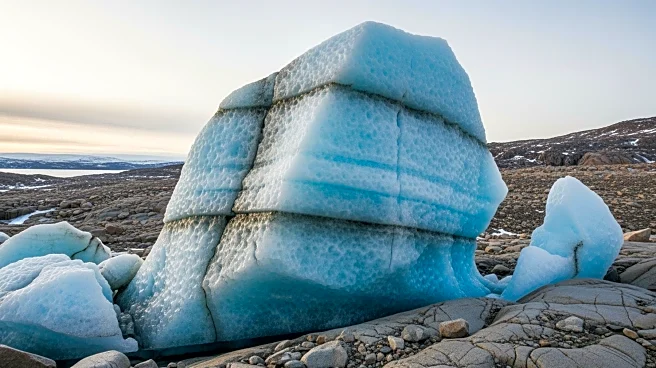What's Happening?
Researchers have uncovered an ancient glacier on a remote island in the Canadian Arctic, potentially dating back over one million years. This discovery, led by geomorphologist Daniel Fortier, began in 2009
when landslides triggered by melting permafrost revealed layered ice above a fossil forest. Radiocarbon dating showed organic matter in the ice to be over 60,000 years old. The glacier's age and the presence of a magnetic mineral alignment suggest it coincides with a 770,000-year-old reversal of Earth's magnetic field. The findings, published in Geology, could provide unprecedented insights into the early Pleistocene epoch, a period marked by glacial cycles.
Why It's Important?
The discovery of this ancient glacier is significant as it offers a valuable paleoenvironmental repository, archiving fossils, flora, organic remains, and ancient DNA. Understanding the glacier's resilience to past climate changes can inform predictions about future climate impacts. As human activities accelerate global warming, glaciers and permafrost are melting, contributing to rising sea levels and threatening coastal communities. The melting also affects ocean acidity, endangering marine ecosystems and food systems. This research underscores the importance of preserving natural archives to better understand and mitigate climate change effects.
What's Next?
The researchers suggest that despite modern climate warming, the ancient permafrost shows resilience, indicating potential for climate balance restoration. However, accelerated thermokarst erosion could destabilize these glacial archives. Supporting research efforts and adopting energy-efficient practices are recommended to reduce pollution threatening glaciers. Continued study and preservation of these natural archives are crucial for understanding and addressing climate change.
Beyond the Headlines
The melting of glaciers and permafrost not only contributes to rising sea levels but also disrupts ocean currents, affecting global climate patterns. The preservation of ancient permafrost is vital for understanding historical climate resilience and guiding future climate policy. The research highlights the interconnectedness of Earth's systems and the need for comprehensive climate action.









